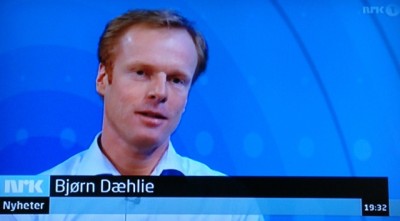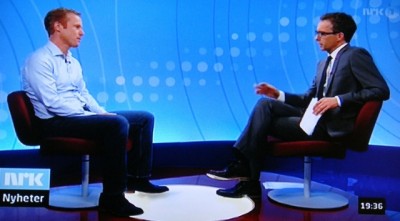Norwegian skiing legend Bjørn Dæhlie is among former winter sports stars caught in a storm of speculation this week over their performance in the 1990s. A Swedish documentary called ‘Blood race in skiing’ has triggered outcry in the Norwegian skiing community after it raised new suggestions of doping and implicated Scandinavian heroes like Dæhlie. The skiers and other sports officials deny any wrongdoing and claim the documentary is based on weak sources and questionable methods.

“I live on my credibility, it means everything to me,” Dæhlie told newspaper Aftenposten and other media outlets as he made the rounds of interviews on Wednesday. He felt a strong need to respond to the latest allegations that seem all but impossible to prove or disprove, since so many years have passed.
Dæhlie won eight Olympic gold medals, nine world championships and 46 World Cup events during his brilliant skiing career, but now the rumours and allegations broadcast on Swedish television have put his reputation at stake. “I don’t feel hunted, though, and I do feel I can stand up straight and look anyone straight in the eye regarding what went on in Norwegian skiing in the 1990s,” Dæhlie said. “There was never a single case of questionable (testing) results.”
Swedish state channel SVT aired the documentary on Wednesday evening, referring to test results showing unnaturally high hemoglobin levels, indicating that skiers manipulated their blood to raise oxygenation and heighten performance.
Manipulation of this kind can be achieved by adding oxygenated blood through transfusion or by using the drug Erythropoietin (EPO). The documentary presented what its producers claimed to be original results showing athletes’ hemoglobin levels from a 1997 World Cup event in Lahti, Finland. These were obtained from former Finnish coach Kari-Pekka Kyrö, who had a central role in a 2001 doping scandal involving the Finnish team at the World Championship in Lahti.
The documentary also claimed that all medal winners at the 1995 World Championship in Thunder Bay, Canada had hemoglobin levels of 17.5 or higher, levels allegedly impossible without some means of cheating. Today, athletes are not allowed to compete with levels higher than 17. The documentary also claimed the average hemoglobin level of male skiers increased every year through the 1990s, before reaching 17.5. When the international skiing federation FIS introduced maximum limits and became capable of detecting usage of EPO, average levels dropped quickly, the documentary stated.
“This is some form of blood manipulation, that is clear,” said Bengt Saltin, a professor with experience in doping issues in the documentary, adding that he could not comment on what type of doping it would be.
‘Shocked’ legend warns legal action
Three Norwegian skiers were specifically mentioned in the documentary including Dæhlie, the most successful Winter Olympic champion in history with eight gold and four silver medals, who also said he was “shocked” by the allegations. He sent a written warning together with the FIS before the program aired that outlined what they believed to be its factual errors, and he has threatened legal action against SVT.

Dæhlie won three individual silver medals and a gold in the 4 x 10km relay in Thunder Bay. “I have never cheated or manipulated my blood,” Dæhlie told newspaper Dagbladet. “My hemoglobin levels have normally been around 15.6-15.8 but I have also reached 16 and 17,” he said. “That may happen during extreme circumstances and be related to training in altitude or to fluid intake.”
Norwegian medal winners Marit Mikkelsplass and Erling Jevne were also mentioned in the documentary, with questions arising over whether their hemoglobin levels were also artificially high before competing. They both denied any wrongdoing and said higher levels could be caused by the extensive height training they did during this time. None of the athletes claimed to have had previous knowledge of their specific hemoglobin levels. Mikkelsplass called the accusations “hurtful” and said it was hard to comment on numbers she had never seen or heard about until now. All the Swedish and Finnish athletes being questioned about their levels also denied any manipulation.
The documentary quoted a sports doctor, Thor-Øistein Endsjø, who said these high hemoglobin levels could be life-threatening when competing. “It’s incredible that it is possible to have such high levels,” Endsjø said. “It is dangerous. They could lead to a stop in circulation.”
The documentary’s producers defended their program. “We are not saying anyone was using drugs,” Nils Hanson, project manager for the documentary, told Dagbladet. “We are using the leading expert in this area from the ski world, Bengt Saltin, and he is drawing the conclusions.”
Former national coach Svein Tore Samdal told Norwegian TV channel TV2 that high hemoglobin levels do not qualify as doping. “Hemoglobin is not doping. Hemoglobin exists natural in our bodies,” he said.
The Norwegian Ski Federation (Norges Skiforbund, NSF) also wrote to SVT, demanding changes in the documentary. “Accusations of high hemoglobin levels are made in such a context that the viewer is left with the clear impression that the athletes in question are suspected of doping,” NSF said. “SVT creates this impression by reference to definitive laboratory tests and by claiming that results from one test above a certain level automatically provide a reason for suspicion.”
Views and News from Norway/Aasa Christine Stoltz
Please support our news service. Readers in Norway can use our donor account. Our international readers can click on our “Donate” button:

